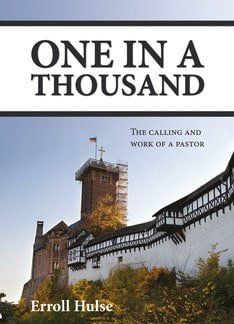Erroll Hulse
EP Books
224, £9.99
ISBN: 978-0-85234-913-7
Star Rating: 4
Erroll Hulse has for many years exercised a worldwide ministry of encouraging pastors and supporting their theological training. Sadly, this has now been curtailed by illness. This book is a passionate exhortation to pastors to be diligent in fulfilling all the duties of their ministry.
It is not a carefully ordered ‘how to’ manual. Rather, it says to pastors, ‘Expand your ambitions for service; don’t get into a rut of sermon-preparation-and-preaching’. It aims to energise the hearts and spirits of pastors in the service of the Lord.
The author says that he has in mind the needs of the developing world, especially Africa, where there is little knowledge of church history. ‘The example of former gifted pastors can be an inspiration to us today’.
Most of the book is a study of various characters and what made them good pastors. The Lord Jesus, Paul, Martin Luther, William Perkins, Richard Baxter, Jonathan Edwards, Martyn Lloyd-Jones and Martin Holdt come before us, with their strengths, and occasionally weaknesses, helpfully discussed.
The chapter on Martin Holdt of South Africa, who went to be with the Lord in 2011, is especially helpful. He himself wrote of the need for the pastor to meditate on Scripture, have a strong prayer life, study diligently, love his people, be assiduous in pastoral visiting and watch over his own soul. These key truths are forcefully taught.
When writing of Luther, the contention is that the care of souls was his driving force, rather than the need for reformation. He was an example in that he preached, ‘not for a classroom but for a battleground’. The aim of preaching, says the author, is to move hearts to repentance and holiness of life.
The book is somewhat diffuse in places, and uneven in its treatment of subjects, and there is the occasional odd statement. But there are many thought-provoking ideas for new and seasoned pastors alike, and sudden gems appear throughout the book (just like in the author’s preaching ministry — this is said with great affection).
It could be read as a counsel of despair, ‘Unless I preach like the Doctor, evangelise like Baxter and am a theologian like Edwards, I am a failure!’ It is saved from this by the emphasis being on the heart, not the gifts, of the pastor. Every pastor should read it, and be humbled, inspired and challenged by it.
John Palmer
Tredegar




